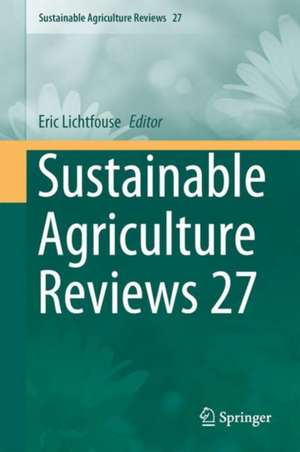Sustainable Agriculture Reviews 27: Sustainable Agriculture Reviews, cartea 27
Editat de Eric Lichtfouseen Limba Engleză Hardback – 24 mai 2018
| Toate formatele și edițiile | Preț | Express |
|---|---|---|
| Paperback (1) | 565.64 lei 38-44 zile | |
| Springer International Publishing – 19 ian 2019 | 565.64 lei 38-44 zile | |
| Hardback (1) | 652.49 lei 3-5 săpt. | |
| Springer International Publishing – 24 mai 2018 | 652.49 lei 3-5 săpt. |
Din seria Sustainable Agriculture Reviews
- 24%
 Preț: 783.49 lei
Preț: 783.49 lei - 15%
 Preț: 641.71 lei
Preț: 641.71 lei - 18%
 Preț: 953.65 lei
Preț: 953.65 lei - 15%
 Preț: 648.24 lei
Preț: 648.24 lei - 5%
 Preț: 1106.69 lei
Preț: 1106.69 lei - 5%
 Preț: 1110.32 lei
Preț: 1110.32 lei - 18%
 Preț: 955.25 lei
Preț: 955.25 lei - 18%
 Preț: 1233.83 lei
Preț: 1233.83 lei - 18%
 Preț: 1123.35 lei
Preț: 1123.35 lei - 18%
 Preț: 1115.46 lei
Preț: 1115.46 lei - 18%
 Preț: 1117.03 lei
Preț: 1117.03 lei - 18%
 Preț: 1387.73 lei
Preț: 1387.73 lei - 18%
 Preț: 1222.80 lei
Preț: 1222.80 lei - 18%
 Preț: 1113.09 lei
Preț: 1113.09 lei - 18%
 Preț: 903.93 lei
Preț: 903.93 lei - 18%
 Preț: 1114.65 lei
Preț: 1114.65 lei - 18%
 Preț: 1223.11 lei
Preț: 1223.11 lei - 24%
 Preț: 1056.88 lei
Preț: 1056.88 lei - 18%
 Preț: 1234.00 lei
Preț: 1234.00 lei - 20%
 Preț: 565.09 lei
Preț: 565.09 lei - 18%
 Preț: 1826.54 lei
Preț: 1826.54 lei - 18%
 Preț: 952.89 lei
Preț: 952.89 lei - 18%
 Preț: 955.08 lei
Preț: 955.08 lei - 18%
 Preț: 950.96 lei
Preț: 950.96 lei - 15%
 Preț: 649.71 lei
Preț: 649.71 lei - 18%
 Preț: 954.62 lei
Preț: 954.62 lei
Preț: 652.49 lei
Preț vechi: 767.63 lei
-15% Nou
Puncte Express: 979
Preț estimativ în valută:
124.86€ • 131.29$ • 103.17£
124.86€ • 131.29$ • 103.17£
Carte disponibilă
Livrare economică 26 martie-09 aprilie
Preluare comenzi: 021 569.72.76
Specificații
ISBN-13: 9783319751894
ISBN-10: 3319751891
Pagini: 290
Ilustrații: VII, 302 p. 78 illus., 61 illus. in color.
Dimensiuni: 155 x 235 mm
Greutate: 0.75 kg
Ediția:1st ed. 2018
Editura: Springer International Publishing
Colecția Springer
Seria Sustainable Agriculture Reviews
Locul publicării:Cham, Switzerland
ISBN-10: 3319751891
Pagini: 290
Ilustrații: VII, 302 p. 78 illus., 61 illus. in color.
Dimensiuni: 155 x 235 mm
Greutate: 0.75 kg
Ediția:1st ed. 2018
Editura: Springer International Publishing
Colecția Springer
Seria Sustainable Agriculture Reviews
Locul publicării:Cham, Switzerland
Cuprins
Chapter 01: Water quality impacts on agricultural productivity and environment. - Chapter 02: Agro-ecosystem diversity in petroleum and natural gas explored sites in Assam State, North-Eastern India: socio-economic perspectives.- Chapter 03: Pest management in stored products: the case of the cigarette beetle, Lasioderma serricorne (Coleoptera: Anobiidae).- Chapter 04: Floriculture Sustainability Initiative: The Dawn of New Era.- Chapter 05: Ozone toxicity and remediation in crop plants.- Chapter 06: Amaranth and millet in the context of “silent hunger” and food distribution.- Chapter 07: Impact of Cyclodextrin in Drug Delivery System: Current Status and Future Perspective.- Chapter 08: Sustainable agriculture in the Republic of Korea.- Chapter 09: Crop productivity in changing climate.- Chapter 10: In vitro propagation of ornamentals for Maximising livelihood security.
Notă biografică
Eric Lichtfouse, is a soil scientist at the French National Institute for Agricultural Research (INRA). He has invented the 13C-dating method allowing to measure the dynamics of soil organic molecules, thus opening the field of molecular-level investigations of soil carbon sequestration. Chief Editor of the awarded journal Agronomy for Sustainable Development, he has raised the journal rank from 29/53 in 2003, with an impact factor of 0.56, to 2/81 in 2014, with an impact factor of 3.99, in the Agronomy category. He is also Chief Editor and founder of the journal Environmental Chemistry Letters and the book series Sustainable Agriculture Reviews. He is lecturing scientific writing and communication in universities worldwide. His publication assistance service at the INRA has founded the french-english newsletter Publier La Science. He has published the book Scientific Writing for Impact Factor Journal. This textbook describes in particular the micro-article, a new tool to identify the novelty of experimental results. Further details are available on Slideshare, LinkedIn, ResearchGate, ResearcherID and Orcid.
Textul de pe ultima copertă
This book deals with a rapidly growing field aiming at producing food and energy in a sustainable way for humans and their children. It is a discipline that addresses current issues such as climate change, increasing food and fuel prices, poor-nation starvation, rich-nation obesity, water pollution, soil erosion, fertility loss, pest control, and biodiversity depletion. Novel, environmentally-friendly solutions are proposed based on integrated knowledge from sciences as diverse as agronomy, soil science, molecular biology, chemistry, toxicology, ecology, economy, and social sciences. Indeed, sustainable agriculture decipher mechanisms of processes that occur from the molecular level to the farming system to the global level at time scales ranging from seconds to centuries. For that, scientists use the system approach that involves studying components and interactions of a whole system to address scientific, economic and social issues. In that respect, sustainable agriculture is nota classical, narrow science. Instead of solving problems using the classical painkiller approach that treats only negative impacts, sustainable agriculture treats problem sources. Because most actual society issues are now intertwined, global, and fast-developing, sustainable agriculture will bring solutions to build a safer world. This book series gathers review articles that analyze current agricultural issues and knowledge, then propose alternative solutions. It will therefore help all scientists, decision-makers, professors, farmers and politicians who wish to build a safe agriculture, energy and food system for future generations.
Caracteristici
The book (and series) is a state of the art on the latest research in sustainable agriculture This book series gathers review articles that analyze current agricultural issues and knowledge, then propose alternative solutions This book (and series) covers multidisciplinary topics and therefore help all scientists, decision-makers, professors, farmers and politicians who wish to build a safe agriculture, energy and food system for future generations
